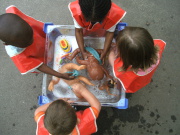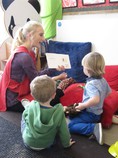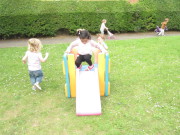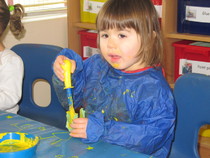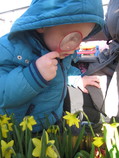
Contact us
Bunnies Preschool (Shephall)
Featherstone Wood School
Featherston Road
Stevenage
Herts
SG2 9PP
Tel: 07754 305 185
shephall@bunniespreschool.co.uk
Please also use our contact form
Bunnies Preschool (Great Ashby)
Great Ashby Community Centre
Whitehorse Lane
Stevenage
SG1 6NH
07562 341 589
greatashby@bunniespreschool.co.uk
NEW STARTERS
For tips and advice to help you and your child on their first day please see our settling in tips sheet. This can be found by clicking on the Info tab at the top of the page, then settling your child.
Opening hours:
Please check each setting for our individual opening hours.
LATEST NEWS
Please see our Facebook pages for all of our latest news.
Our curriclum
We follow the Early Years Foundation Stage (EYFS) curriculum to shape and develop all our activities and routines thus ensuring that we offer the best developmentally appropriate play and learning opportunities for each and every child in our care.
The revised EYFS curriculum covers seven intertwining areas of learning. These are further split into ‘prime’ and ‘specific’ areas of learning. The three ‘prime’ areas provide solid foundations for a child’s readiness for learning. They help to ignite a child’s curiosity, support them in forming relationships and they build on the child’s capacity to learn. The three prime areas which we concentrate on in the early years are communication and language, personal, social and emotional development and physical development. The four more specific areas of learning help to strengthen and support the prime areas setting the child with firm foundations for moving onto the national curriculum in later years. The specific areas of learning are literacy, maths, understanding of the world and expressive arts and design, all of which are intertwined in our curriculum.
For a copy of 'The Parents' Guide to the Early Years Foundation Stage' please follow the link at the bottom of the page.
The prime areas explained
Personal, Social and Emotional (PSE)
PSE for children means making relationships, exploring feelings, being well cared for and being valued. These are all crucial for physical, social and emotional well being. Following good examples set by adults, having the freedom to explore new environments and developing a feeling of importance will help children to become self confident and self aware individuals. This in turn will help them to feel secure and achieve their best. Within preschool children will be encouraged to express their feelings and opinions, learn about their own and others’ behaviour and the consequences of both their and others’ actions, thus developing ways to deal with both positive and negative feelings. This will help build emotional resilience for later life, helping children to develop their skills for building relationships.
Examples of PSE activities include happily settling at preschool, playing alongside other children or with them, turn taking, having confidence to try out new experiences, talking about past events or their home life, and participating in a wide range of imaginative play.
Communication and language (C&L)
Having the skills to communicate effectively in both speaking and listening is fundamental to a child’s well being. It is also vital to help individuals to participate in society during later years. Good communication skills allow children to form relationships, share feelings and emotions. Understanding and being understood builds a child’s confidence and helps them to become strong individuals who are better able to deal with adult life. Communication is about listening as well as talking in a range of situations; it is vital that adults set a good example by actively listening; this will show the child that what they are saying is valued. Within preschool we promote the development of communication, language and literacy skills through all our activities, specifically through singing, small group work, encouraging children to talk to staff and other children, through listening to instruction and developing attention skills, understanding the rules and boundaries of the setting and playing socially with others. Children are encouraged to speak and to listen to others in social activities and are later encouraged to think and talk about ‘how’ and ‘why’ things happen.
Physical development: Children learn by being active. Physical development takes place in all areas of learning and development and involves both large and small movements. Physical development helps children to improve their co-ordination and control, manipulation and movement. It helps them to gain confidence in what they can do. The health and self care aspects of physical development are also actively encouraged in preschool to help children learn the importance of staying healthy through exercise, diet and staying safe. Children feel the benefits of being active, and we actively encourage children to take controlled risks in our safe environment to further develop their physical skills. Examples of physical activities at preschool include jumping, climbing, balancing, running, walking and stretching, completing puzzles, threading or mark making. All children are encouraged be active and we talk daily about the importance of a healthy lifestyle during our snack times.
The specific areas of development explained
Literacy: During their preschool years we ensure that all children have the opportunity to develop their early reading and writing skills. Examples of how we promote reading within the preschool include regular story and song times, giving the children plenty of opportunities to explore writing and print in their environment, encouraging children to handle and look through books both alone and in social groups. We also have a home books scheme where children can borrow books from our library to enjoy sharing at home.
Mathematics (Maths): Within preschool children will be given the opportunity to practise and build upon their understanding of problem solving, reasoning and numeracy to gain competence and confidence in using maths. They will begin to recognise and seek patterns and connections through exploring numbers, shape, space and measurements. These skills will help them to solve problems and make headway in all other areas of development. Examples of this are recognising shapes, sequences, jigsaw puzzles, understanding of size and capacities, counting, colour recognition, understanding the concept of time. Gaining confidence in their abilities increases their feeling of self importance and their resilience to daily challenges, skills which can help them cope with problems in later adult life.
Expressive arts and design: This area of development allows children to explore and express themselves and involves them making choices and decisions. One of the most important aspects of this developmental area is to ensure the children feel that they, their feelings, opinions and work are valued. This is crucial to build strong self confidence, resilience and esteem. Possessing these attributes will help children to grow into strong adults able to cope with our world and adult experiences. Most importantly, the creative area of development allows for children to have fun getting messy! Examples of creative activities include singing, exploring musical instruments, gluing, painting, drawing etc.
Understanding the world: We believe that children should be allowed to find out about their world by exploring many different resources. They should have access to accurate information and opportunities to learn about different ways of learning. This area of development helps children to learn to respect and value all people regardless of their origin and abilities and to understand that other children don’t always enjoy the same things. This can help to avoid children developing prejudices and negative attitudes in later life. A child’s questioning, interest and curiosity is always encouraged in the classroom, helping them to learn about the world around them and make sense of it. By encouraging and allowing children to make their own decisions about what and how to investigate their self esteem and self awareness are further developed.
Examples of activities promoting your child's knowledge and understanding of the world include using computers, talking about past events or their home life, understanding and accepting the differences between us all, similarities and differences in relation to places, objects, materials and living things.
Would you like to learn more about our approach?
Please contact us on 07754 305185 or use our contact form.
